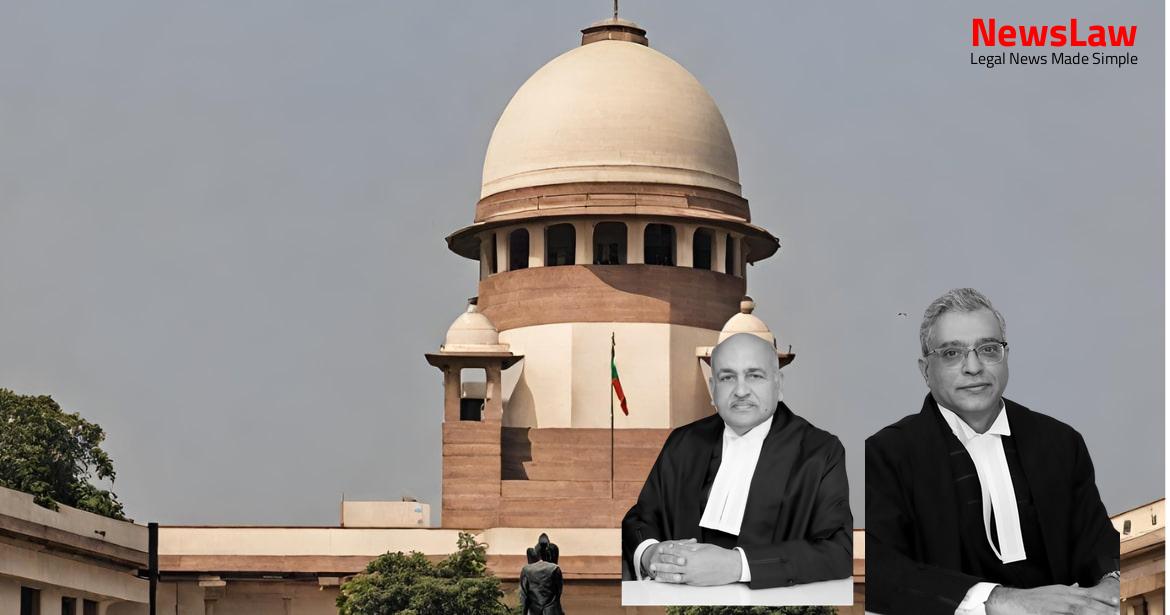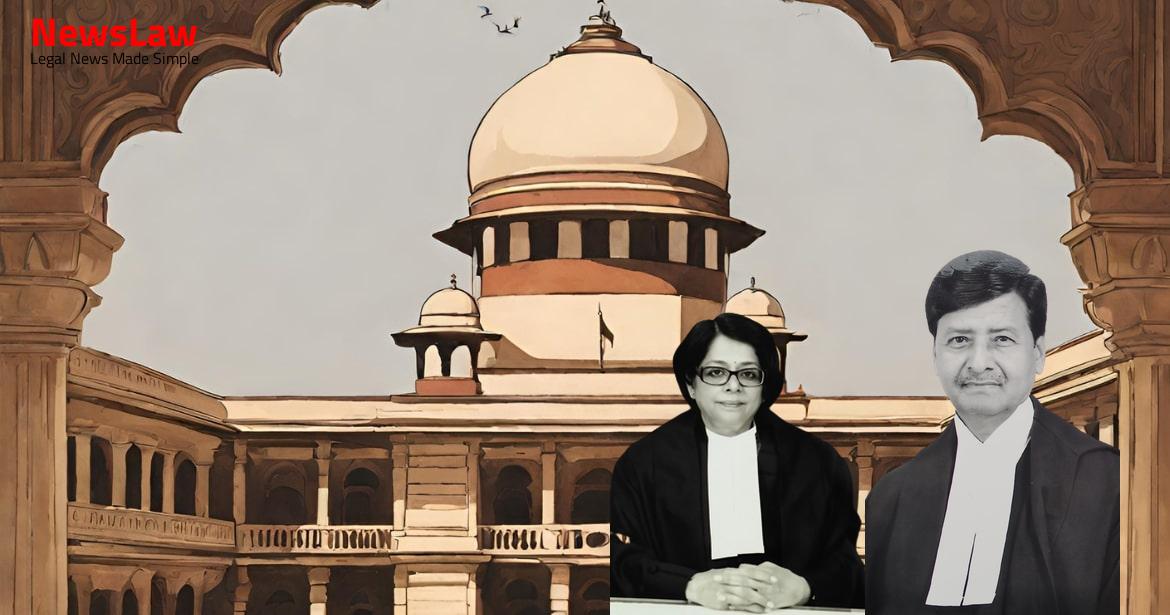In a significant legal battle, the Supreme Court of India has resolved a long-standing dispute over land ownership between Maharani and Cantonment Board. The case delves into the intricate details of land settlements and possessory rights, ultimately leading to a decisive judgment. The Court’s ruling, restoring the trial court’s decision, establishes clarity on the rightful ownership of the contested land. #LegalCase #SupremeCourt #LandDispute
Facts
- The Cantonment Board never came in possession of more than 2.55 acres of land, excluding the land settled and occupied by the plaintiff-appellant.
- The Title Suit of the plaintiff-appellant was decreed by the court of first instance on 16.03.2000.
- The Court of Wards managed the land and released it in Raja’s favor in 1937.
- The suit filed by the Maharani was dismissed on 31.03.1984 due to lack of maintainability and failure to prove ownership and possession.
- A compromise was reached where the plaintiff-appellant admitted possession of 0.30 acres of land in Plot Nos. 432 and 438.
- The disputed land in the suit was 0.12 acres of Plot No. 432 and 0.18 acres of Plot No. 438, totaling 0.30 acres.
- The plaintiff-appellant claimed title and possession over the land settled by the Raja in 1942, which was further confirmed by mutation in 1963.
- The Cantonment Board claimed rights over 2.55 acres of land based on possessory rights granted by the Raja.
- Maharani’s claim over the land was part of a previous suit which had been contested by the plaintiff-appellant based on raiyati rights granted by the Raja in 1942.
- The plaintiff-appellant’s second appeal was dismissed by the High Court due to the lack of substantial question of law.
- The plaintiff-appellant has now appealed the judgment of the High Court dated 01.04.2009.
- The plaintiff-appellant also challenges the judgment of the First Appellate Court dated 28.06.2006, claiming his suit was not barred by res judicata.
- The plaintiff-appellant asserts valid acquisition of title and possession over the disputed land in question.
- Title Suit No. 9/89 was filed by the plaintiff-appellant for declaration of title and confirmation of possession over properties in Schedule ‘A’ of the plaint.
Also Read: Clarification on Customs Duty Payment in Confiscation Proceedings
Issue
- Limited issue: Whether Maharani acquired any right in the property based on the alleged maintenance in grant by the Raja.
- First point of consideration: Whether any substantial question of law was involved in the second appeal based on the facts and circumstances of the case.
Also Read: High Court Upholds Conviction of Accused Nos. 1-6 in the Case of Mohan Mungase’s Murder
Analysis
- The principle of res judicata applies not only between the plaintiff and defendants but also between co-defendants.
- For the principle of res judicata between co-defendants to apply, three conditions must be fulfilled: conflict of interest, necessity to decide the conflict for relief to the plaintiff, and a final decision adjudicating the conflict.
- The plaintiff-appellant possesses the suit land as per revenue records, proving his possession.
- No settlement of the suit land was made in favor of the Cantonment Board, and their claim was limited to only 2.55 acres of the entire land.
- The conflict in the present suit concerns only 0.30 acres of the land, distinct from the previous Suit No.8/64.
- The previous suit did not directly or substantially address the issue of the suit land’s ownership between the plaintiff-appellant and the Cantonment Board.
- The High Court erred in dismissing the appeal on the basis of no substantial legal question being involved.
- The rights of co-defendants in the previous suit were not adjudicated upon, and thus, the present suit is not barred by res judicata.
- The judgment in the earlier suit did not conclusively decide the rights of the plaintiff-appellant or the Cantonment Board over the suit land.
- No conflict of interest existed between the co-defendants in the previous suit regarding the suit land, therefore not fulfilling the conditions for res judicata.
- The plaintiff-appellant’s claim over the suit land was never adjudicated upon in the previous suit, where the conflict focused on other land portions.
- The Cantonment Board’s rights were limited to 2.55 acres and did not encompass the entire 5.38 acres settled by the Raja.
- The judgment in the previous suit did not address the specific claims of the plaintiff-appellant or the Cantonment Board over the suit land.
- The settlement of the land in favor of the plaintiff-appellant was confirmed by the Additional Collector, providing validity to his claim.
- The court’s decision to not adjudicate the co-defendants’ rights regarding the suit land in the previous suit renders the principle of res judicata inapplicable.
- The Cantonment Board’s claim of adverse possession over the entire 5.38 acres was not established in the earlier suit, which did not address the claims of the plaintiff-appellant.
- The Raja settled the suit land in favor of the plaintiff-appellant in 1942, and the judgment in Suit No.8/64 did not affect this settlement.
- The possession claim of the Cantonment Board over the entire land was not upheld in the earlier suit, which did not delve into the specific claims of either party over the suit land.
- In the case of Govindammal (Dead) by Legal Representatives and Ors. vs. Vaidiyanathan and Ors., the Court considered previous decisions on the application of the principle of res judicata between co-defendants.
- After reviewing the earlier rulings, the Court established three conditions for the application of res judicata between co-defendants.
- The three conditions outlined by the Court are: 1. The parties were sued in the previous suit on the same cause of action. 2. The parties in the current suit were co-defendants in the previous suit. 3. The previous suit was decided by a competent Court.
- Cantonment Board accepted that the plaintiff-appellant has been collecting rent from tenants of the shops on the suit land
- First Appellate Court erred in reversing the finding of the court of first instance regarding plaintiff’s settled possession and ownership rights
- Plaintiff-appellant successfully proved ownership rights over the suit land with overwhelming unconfronted evidence
Also Read: Justice for Shyamo Devi: Supreme Court Overturns Land Allotment Cancellation
Decision
- The appeal is allowed with no order as to costs.
- The judgment and order of the High Court dated 01.04.2009 and that of the First Appellate Court dated 28.06.2006 are set aside.
- The judgment and order dated 16.03.2000 passed by the trial court is restored decreeing the title suit of the plaintiff-appellant.
Case Title: HAR NARAYAN TEWARI (D) THR. LRS. Vs. CANTONMENT BOARD,RAMGARH CANTONM.. (2024 INSC 467)
Case Number: C.A. No.-008829-008829 – 2010



